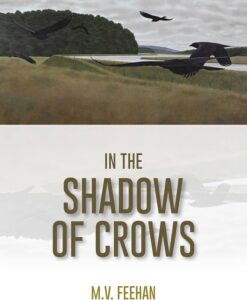‘One for sorrow / Two for joy’
In the Shadow of Crows
by M.V. Feehan
Montreal: Baraka Books, 2024
$19.95 / 9781771863476
Reviewed by Candace Fertile
*

In the Shadow of Crows, M.V. Feehan’s first published collection of short stories, focusses on the fictional small town of St. Anne’s, Nova Scotia. The stories are loosely patterned after the children’s rhyme about crows, “One for sorrow…,” and the collection traces various members of the Carrol family over several decades. Crows inhabit the stories, with characters taking notice of them and how many there are.
The first story opens with the announcement of a death: “On the day he died, Emmet had been restless.” Emmet is the husband of Lily, and they are parents to Findlay, Teresa, Annabel, Carlie, and James. The three older children feature in their own stories, and another important character is Lily’s Aunt Rose, who is more like a big sister. The first story alternates between Emmet’s last minutes in the St. Anne’s hospital in 1991 and his waiting for Lily to collect him at the Hart’s Crossing train station in 1945 on his return home from the war.
Emmet is a complex character as he garners both sympathy for his suffering and criticism for his infliction of suffering on others, notably his children, especially his son Fin, whom he beats. Feehan does a good job of showing how people are contradictory and certainly not just one thing. As Emmet realizes he is dying, he sees a crow fly into his room: “She paused on the sill for a moment before the youngest nurse chased her from the solemn event.” A crow also appears when he is waiting at the train station, and this time the sorrow is for Sammy McCormick, a fellow soldier, whose parents are collecting his body from the train. Each story has corresponding attentiveness to crows on the part of the characters.

The third story, “Three for a Message,” details another kind of complexity. Annabel has dual Canadian-American citizenship as Lily was American, but her husband and son are Canadian, and they refuse to apply for American citizenship. They have to renew visas every year, though one year, because of deaths in the family, they forget. The chance of father and son being deported is real and anxiety-producing, and anyone who has had any issues crossing the Canada-US border can no doubt feel the family’s worry. A former long term resident of Vancouver and Victoria, Feehan does lovely work in showing the problems and also how they can sometimes be solved by people behaving kindly.
But kindness doesn’t always work or even survive the disputes in a family. Teresa is an alcoholic and at odds with Fin, and years pass without contact between the siblings. The strongest sibling relationship is between Lily and Rose, niece and aunt. When Lily is pregnant with her second child, Teresa, Rose grieves the lack of her own child. But Rose loves Findlay and is instrumental in helping Lily with him and with childbirth, given the isolation of their houses.
The final story, “In the Shadow of Crows,” is set in 1924 and recounts Lily’s journey as a child from the US to Canada to live with her grandparents. The perspective of the child via a third person narrator is a bit overdone, and the story doesn’t add much to the overall arc. The most compelling stories are those revealing the problems of adults. The most curious incident occurs in “Seven for Secret Never to be Told,” in which Fin’s unnamed sister is summoned to a doctor’s office and told that he is about to undergo an experimental treatment to treat anxiety and childhood trauma. The catch is that she must sign a form saying she will never tell anyone and will never try to see her brother again.
The stories attest to the fact that no life is simple. Characters make mistakes, long for different lives, and contain a multitude of emotions. The focus on one family shows how different each member’s experience of that family is, in part because of their own personality and in part because of their role in the family. The more troubled characters, such as Rose and Teresa, are portrayed in particularly sensitive ways. And Feehan handily employs both third and first-person narrators, with dialogue that aptly captures the time frame of each story.
Overall, the stories have many appealing elements although the attention to the crow motif seems more restrictive than beneficial. But given the brevity of the book, Feehan manages to pack quite a bit of emotion and detail into the stories, which provide glimpses into the messiness of family dynamics.

*

Candace Fertile has a PhD in English literature from the University of Alberta. She teaches English at Camosun College in Victoria, writes book reviews for several Canadian publications, and is on the editorial board of Room Magazine. [Editor’s note: Candace Fertile has reviewed books by S.C. Lalli, Rebecca Godfrey with Leslie Jamison, Ian and Will Ferguson, Shashi Bhat, Carleigh Baker, Kathryn Mockler, Lucia Frangione, Darcy Friesen Hossack, Robin Yeatman, Emi Sasagawa, Patti Flather, Peter Chapman, Janie Chang, Pauline Holdstock, Ava Bellows, Beth Kope, Geoff Inverarity, and Angélique Lalonde for BCR.]
*
The British Columbia Review
Interim Editors, 2023-25: Trevor Marc Hughes (nonfiction), Brett Josef Grubisic (fiction and poetry)
Publisher: Richard Mackie
Formerly The Ormsby Review, The British Columbia Review is an online book review and journal service for BC writers and readers. The Advisory Board now consists of Jean Barman, Wade Davis, Robin Fisher, Barry Gough, Hugh Johnston, Kathy Mezei, Patricia Roy, Maria Tippett, and Graeme Wynn. Provincial Government Patron (since September 2018): Creative BC. Honorary Patron: Yosef Wosk. Scholarly Patron: SFU Graduate Liberal Studies. The British Columbia Review was founded in 2016 by Richard Mackie and Alan Twigg.
“Only connect.” – E.M. Forster